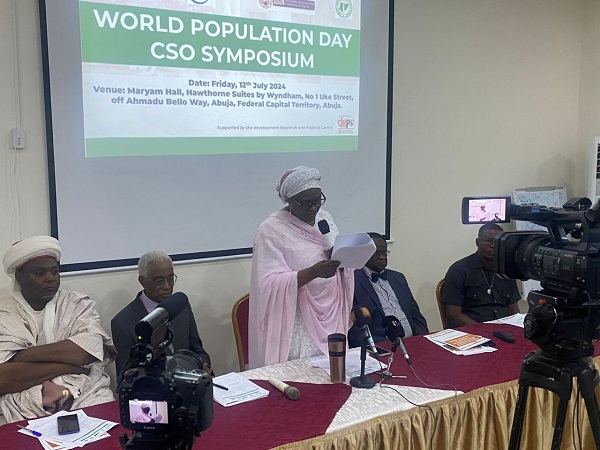
The Federal Government has stated that investing in family planning initiatives can significantly reduce the maternal mortality ratio by 30 per cent.
Special Adviser to the President on Health, Dr. Salma Anas-Kolo made this announcement at the weekend in Abuja during the 2024 National Symposium to commemorate World Population Day.
Science Nigeria reports that this year’s symposium, themed “Embracing the Power of Inclusive Data Towards a Resilient and Equitable Future for All,” was organised by the Population Association of Nigeria (PAN) in collaboration with various CSOs and supported by the Development Research and Project Centre (dRPC). The symposium aimed to improve family planning services and healthcare access across the country.
Anas-Kolo emphasised the critical role that access to family planning services plays in improving maternal health outcomes. “Family planning is more than a health service; it is a critical component of maternal and child health. By allowing women to space and plan their pregnancies, family planning reduces the risk of complications that can arise from closely spaced or unintended pregnancies,” she said.
She noted that the maternal mortality ratio, which measures the number of maternal deaths per 100,000 live births, remains a significant concern in many parts of the world, particularly in developing countries. “According to recent studies, providing comprehensive family planning services can prevent up to 30 percent of maternal deaths. This is because planned pregnancies allow women to seek timely prenatal care and ensure they are in optimal health before conceiving,” she added.
Anas-Kolo underscored the critical importance of family planning in improving maternal health outcomes in the country. She highlighted family planning as a key investment for demographic dividends, empowering individuals to make informed reproductive choices and enhancing health and economic outcomes. “Nigeria must align its demographic growth with its ability to support its people sustainably, focusing on economic stability, environmental sustainability, healthcare, education, social and political stability, and gender equality,” she said.
In a joint lead presentation on “Contraceptive Accessibility and Costs Amidst the Cost-of-Living Crisis,” chairman of the management committee of the Association for the Advancement of Family Planning, Dr. Ejike Oji noted the availability of $3 million for family planning in the country. Oji said that since 2012, family planning has been free, with an additional $8.3 million allocated for commodities. “Investing in family planning services is one of the most effective strategies to reduce maternal mortality. When women have access to contraception and can plan their pregnancies, they are less likely to experience complications that lead to maternal deaths,” he said.
Despite the clear benefits, director of projects at dRPC, Dr. Stanley Ukpai pointed out that many barriers to accessing family planning services remain. “These include cultural stigmas, lack of education, and insufficient healthcare infrastructure. Addressing these challenges requires a multifaceted approach involving government policies, community education and international support,” he said. He called on state governments to prioritise family planning services in the global effort to reduce maternal mortality.
During the presentation, strategic content lead at Nigeria Health Watch, Mr. Alexander Chiejina highlighted the importance of achieving Universal Health Coverage (UHC) by 2030. Chiejina called on governments at sub-national levels, CSOs and stakeholders to advocate for increased family planning funding, leverage technology for last-mile distribution, and raise awareness at the community level.
President of the Population Association of Nigeria, Prof. Enang Erena said that the country has not effectively addressed rapid population growth. Erena said that while family planning awareness is high, acceptability remains low. He called for improved education, innovation and less reliance on donor funds.
Representing the director and head of the family health department at the FMOH, Dr. Oluseyi Omokore said that despite increasing family planning interventions, results were not proportional. Omokore stressed the need for more effective strategies for Nigeria’s 40 million women of reproductive age.
World Population Day, established by the United Nations in 1989, is celebrated every July 11 to focus on global population issues. Nigeria, the most populous country in Africa and the seventh in the world, has a population exceeding 220 million. This rapid population growth presents both challenges and opportunities for sustainable development.
Experts said that a large population can stimulate economic growth and with strategic investments and policies, Nigeria can harness this potential to improve the quality of life for its citizens. However, rising inflation, unemployment and insecurity highlight the need for effective population management to achieve sustainable development.


